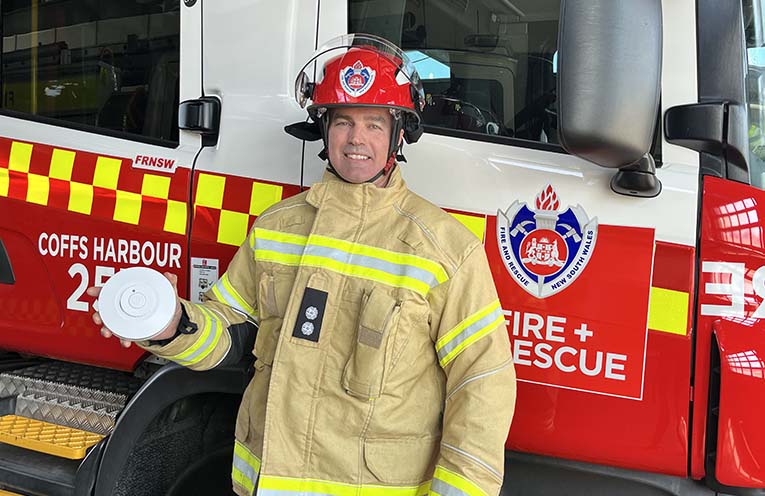
MAKE sure you have working smoke alarms; it’s the biggest lifesaver in structure fires.
That is the message from Acting Station Officer Tim George from Fire and Rescue NSW (FRNSW) Coffs Harbour.
 Advertise with News of The Area today.
Advertise with News of The Area today.It’s worth it for your business.
Message us.
Phone us – (02) 4981 8882.
Email us – media@newsofthearea.com.au
Moving into a warmer dry season, Spring sees the city’s fire services pressing the important points of what to do to set yourself up for the best outcome should you experience a fire on your property.
“Smoke alarms save lives,” said Tim.
FRNSW’s recommendation is to have at least one smoke alarm in working order, installed in or near bedrooms as a priority.
“We also recommend you invest in at least one fire extinguisher for your home.
“If you have several, ensure they’re interconnected so an alarm sounding in one part of your home will activate the others.
“We hear it time and again, that people hear the smoke alarm going off and they get out of the house.”
The next steps are crucial.
“Get out, stay out and call triple zero,” he said, “and don’t risk your life by going back in for a few belongings.
“We’ve got the training and equipment to take charge and handle the fire emergency situation.”
Preparation is also key.
“Residents need to have an escape plan that everyone on the property knows about.”
For those needing guidance on making an emergency escape plan there’s resources on the FRNSW website.
“There’s plenty of instructions on there to make your home fire escape plan.”
Tim lists a few important things to consider.
Where is the easiest escape route in the event of a fire?
Do you have a back-up option?
Are you able to phone Triple-Zero (000)?
Do you have stairs that might be cut off in a blaze?
What about access to a torch if the power goes out?
Don’t do it next week, do it now, Tim urged.
There were 930 residential fires across NSW in spring last year.
No fewer than 40 percent of them started in kitchens or cooking areas.
“Always keep ‘looking while you’re cooking’ and if a fire breaks out on your stove, never throw water on it…that will make the flames more intense,” Tim warned.
“Ensure you have a fire blanket nearby to place over the fire and smother the flames.
“This is the time of year when we tend to get stuck into some spring cleaning,” Tim said.
“Clear your yards of debris and flammable materials like cardboard boxes and old furniture that could catch alight in a bushfire.
“Cut back any foliage you might have and clear your gutters of leaf litter.
“The warmer weather also means barbecues.
“When you’re cleaning your gas-powered outdoor cookers, check there are no leaks and that hoses and nozzles are in good, working order.
“As the weather gets warmer, you’ll be using your e-bike or e-scooter more.
“Remember, don’t charge it where it will block your exit path out of the building if there is a fire.
“The time to think about these issues is now…not in the heat of a house fire,” Tim observed.
“Familiarise yourselves with identifying your path to safety and maybe run a few fire drills with others in your home.
“Every second counts and you can improve your odds of survival by following this advice.”
By Andrea FERRARI

